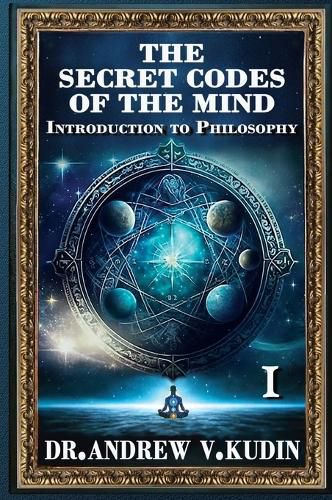Readings Newsletter
Become a Readings Member to make your shopping experience even easier.
Sign in or sign up for free!
You’re not far away from qualifying for FREE standard shipping within Australia
You’ve qualified for FREE standard shipping within Australia
The cart is loading…






This title is printed to order. This book may have been self-published. If so, we cannot guarantee the quality of the content. In the main most books will have gone through the editing process however some may not. We therefore suggest that you be aware of this before ordering this book. If in doubt check either the author or publisher’s details as we are unable to accept any returns unless they are faulty. Please contact us if you have any questions.
The Secret Codes of the Mind: Introduction to Philosophy (Revised Academic Edition) offers a systematic introduction to the fundamental concepts and methods of philosophy essential for academic study.
Volume One, the opening work in a structured six-volume series, provides a comprehensive foundation through clearly developed lectures enriched with discussions and exercises tailored for university courses.
Lecture 1: Definition of Philosophy, Main Branches, Concepts, and Their Practical Application
Defines philosophy and explores its origins, emphasizing its role in examining existence, knowledge, morality, and society. The lecture highlights philosophy's central question - What is primary: being or consciousness? - and outlines its major branches:
Metaphysics, Epistemology, Ethics, Aesthetics, Logic, and Political Philosophy.
Lecture 2: Philosophical Methods
Introduces major methods of philosophical inquiry - dialectical, metaphysical, hermeneutic, analytical, deductive, empirical, phenomenological, materialist, idealist, rationalist, critical, existential, pragmatic, historical, dialogical, and deconstructivist - each presented with clarity and attention to its practical application.
Lecture 3: Core Philosophical Categories
Examines fundamental categories such as being, causality, truth, unity, and diversity. Includes analyses of Aristotle's metaphysics, Kant's epistemological categories, Hegel's dialectics, and Peirce's pragmatism within their historical contexts.
Lecture 4: Consciousness, Matter, Space, and Time
Explores philosophical perspectives on consciousness and matter, tracing conceptions of space and time from Aristotle and Augustine to Einstein, Bergson, and Heidegger.
Lecture 5: Philosophy of Freedom
Addresses the problem of free will and determinism, along with modern debates on freedom of speech and civil liberties. Classical and modern views (Augustine, Spinoza, Kant) are compared and critically discussed.
Each lecture provides historical context, concise explanations, focused discussion questions, practical exercises, and selected readings designed to develop academic understanding and critical thinking skills.
The Secret Codes of the Mind: Introduction to Philosophy (Volume One) offers students a rigorous yet engaging path into the world of philosophy - a curriculum built for intellectual depth, clarity, and scholarly development.
$9.00 standard shipping within Australia
FREE standard shipping within Australia for orders over $100.00
Express & International shipping calculated at checkout
Stock availability can be subject to change without notice. We recommend calling the shop or contacting our online team to check availability of low stock items. Please see our Shopping Online page for more details.
This title is printed to order. This book may have been self-published. If so, we cannot guarantee the quality of the content. In the main most books will have gone through the editing process however some may not. We therefore suggest that you be aware of this before ordering this book. If in doubt check either the author or publisher’s details as we are unable to accept any returns unless they are faulty. Please contact us if you have any questions.
The Secret Codes of the Mind: Introduction to Philosophy (Revised Academic Edition) offers a systematic introduction to the fundamental concepts and methods of philosophy essential for academic study.
Volume One, the opening work in a structured six-volume series, provides a comprehensive foundation through clearly developed lectures enriched with discussions and exercises tailored for university courses.
Lecture 1: Definition of Philosophy, Main Branches, Concepts, and Their Practical Application
Defines philosophy and explores its origins, emphasizing its role in examining existence, knowledge, morality, and society. The lecture highlights philosophy's central question - What is primary: being or consciousness? - and outlines its major branches:
Metaphysics, Epistemology, Ethics, Aesthetics, Logic, and Political Philosophy.
Lecture 2: Philosophical Methods
Introduces major methods of philosophical inquiry - dialectical, metaphysical, hermeneutic, analytical, deductive, empirical, phenomenological, materialist, idealist, rationalist, critical, existential, pragmatic, historical, dialogical, and deconstructivist - each presented with clarity and attention to its practical application.
Lecture 3: Core Philosophical Categories
Examines fundamental categories such as being, causality, truth, unity, and diversity. Includes analyses of Aristotle's metaphysics, Kant's epistemological categories, Hegel's dialectics, and Peirce's pragmatism within their historical contexts.
Lecture 4: Consciousness, Matter, Space, and Time
Explores philosophical perspectives on consciousness and matter, tracing conceptions of space and time from Aristotle and Augustine to Einstein, Bergson, and Heidegger.
Lecture 5: Philosophy of Freedom
Addresses the problem of free will and determinism, along with modern debates on freedom of speech and civil liberties. Classical and modern views (Augustine, Spinoza, Kant) are compared and critically discussed.
Each lecture provides historical context, concise explanations, focused discussion questions, practical exercises, and selected readings designed to develop academic understanding and critical thinking skills.
The Secret Codes of the Mind: Introduction to Philosophy (Volume One) offers students a rigorous yet engaging path into the world of philosophy - a curriculum built for intellectual depth, clarity, and scholarly development.